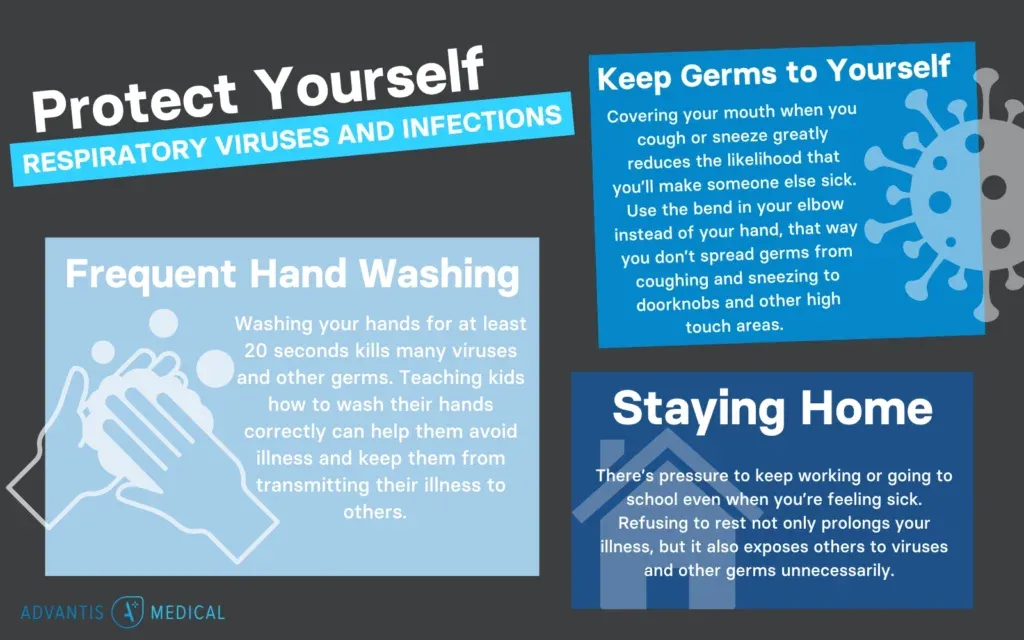Respiratory viruses run rampant in the fall and winter—especially among young children who aren’t as vigilant about handwashing and covering their mouths when they cough and sneeze. Adults often end up with these nasty bugs as well, catching them from their own children, coworkers, or patients if they work in healthcare settings.
RSV vs. Croup: Tripledemic 2025
There’s been a lot of talk about respiratory syncytial virus (RSV) because of an uptick in cases this winter. While RSV has always been a concern for infants and toddlers, older children also became especially ill this fall and winter season.
This is due to the severity of COVID, flu, and RSV outbreaks that hit all at once in what’s been dubbed a tripledemic.
A related infection called croup is frequently linked to RSV, but they aren’t the same thing. The biggest difference between RSV vs. Croup is that RSV is a virus, while croup is a type of common respiratory illness. Here’s what you need to know.
What is RSV?
Respiratory syncytial virus, or RSV, is a virus that affects the respiratory tract and airways. Most adults and older children have mild cases that mirror a cold, while infants, toddlers, and elderly people have a higher risk of serious illness.
As a result, it’s really important for people who have symptoms of RSV or any other respiratory illness to stay away from infants and other medically vulnerable people.
RSV: Symptoms, Diagnosis, and Parental Guidance
The only way to confirm an RSV diagnosis is with a test since symptoms are so similar to the common cold, flu, and other viruses. Common symptoms include runny nose, fever, coughing, and sneezing. People who have RSV might also experience decreased appetite or wheezing.
Parents should closely monitor children who have RSV because their illness may escalate to include difficulty breathing, high fever, and other serious complications. They should seek medical intervention should their child develop any of these worrisome symptoms.
Even though RSV is responsible for many pediatric hospitalizations each year, most children get it by the time they’re two years old without developing serious complications.
What is Croup?

Croup is also common among young children. But croup itself isn’t a virus—other viruses cause croup, an isolated infection in the upper part of the airway.
The viruses causing croup are contagious, and while a child may catch the virus, they may not necessarily develop croup symptoms. RSV is one of the viruses that frequently cause croup. Other viruses like the flu, adeno-, and enteroviruses are also common culprits.
Croup: Symptoms, Causes, and When to Seek Medical Attention
Getting croup usually sounds a lot scarier than it is. In addition to the usual cold symptoms like runny nose, congestion, and fever, there are audible croup symptoms that may cause parents and children to worry. Most notably, kids and adults who have croup may develop a croup cough that sounds like a seal’s bark.
People who get croup may also have stridor, a high-pitched whistle you can hear as you breathe. Adults can contract the viruses causing croup, but they rarely develop croup symptoms due to the larger diameter of their upper airway than children.
Stridor and difficulty breathing are always signs that someone needs medical attention. If you or a loved one experience either of these symptoms, you must seek medical attention promptly.
Similarities and Differences Between RSV and Croup
Respiratory syncytial virus (RSV) and croup are two common respiratory illnesses affecting children, particularly those under 3. While they share some similarities, they also have distinct differences.
Diagnosing RSV and Croup
Diagnosing RSV and croup typically involves a combination of physical examination, medical history, and laboratory tests.
RSV vs Croup Risk Factors
Some people are more likely to get seriously ill from RSV and croup because they have certain risk factors. One of the most common risk factors is age because it makes you medically vulnerable. Infants and toddlers are still developing their immune system, while elderly people often have compromised immune systems. In both cases, it makes it harder for their bodies to fight off infections. While adults can contract the viruses causing croup, they rarely develop croup symptoms due to the larger diameter of their upper airways compared to children.
Other risk factors for serious complications from RSV and croup are exposure to secondhand smoke, premature birth, heart and lung conditions, and any disease or treatment that compromises the immune system. Secondhand smoke is responsible for a whole host of health issues among children. It can worsen a child’s cough if they have croup or another respiratory illness.
Warning Signs and When to Seek Medical Attention
It is essential to seek medical attention immediately if your child is experiencing any of the following warning signs:
- Difficulty breathing or rapid breathing
- Severe coughing spells or a barking cough
- Stridor (a high-pitched noise when breathing in)
- Pale or blue-tinged skin
- Refusal to drink fluids or showing signs of dehydration
- Fever over 104°F (40°C)
- Severe headache or stiff neck
- Vomiting or diarrhea
If your child is experiencing any of these symptoms, seek medical attention immediately. Early treatment can help prevent complications and reduce the risk of severe illness.
In addition to these warning signs, it is also essential to seek medical attention if your child is experiencing any of the following:
- Cold symptoms that worsen over time
- Respiratory symptoms that do not improve with treatment
- A history of respiratory problems or premature birth
- Exposure to someone with RSV or croup
By recognizing the similarities and differences between RSV and croup and seeking medical attention at the first sign of warning signs, you can help your child receive the best possible care and reduce the risk of complications.
Treating Croup and RSV
Mild cases of RSV and croup are pretty easy to manage at home, but getting guidance from an urgent care or a primary care provider is always a good idea. In most cases, the healthcare provider will recommend:
- Drinking lots of fluids
- Managing fever with an over-the-counter medication
- Getting plenty of rest
You can soothe symptoms of croup by inhaling steam in a hot shower and using a humidifier. Your doctor may prescribe steroids, nebulization treatments, or other medications that address the root cause of croup.
More serious symptoms of RSV require closer management by a healthcare provider. In the most severe cases, children and elderly people may need hospitalization so they can get assistance for difficulty breathing and fluids for dehydration. Some cases even require intubation due to severe symptoms.
Preventing Respiratory Viruses and Infections
Preventing croup and RSV is difficult among little ones, especially since they aren’t as mindful of hand hygiene and keeping germs to themselves. However, transmission can be reduced with proper hygiene and etiquette:
Frequent hand washing.
Washing your hands for at least 20 seconds kills many viruses and other germs. Teaching kids how to wash their hands correctly can help them avoid illness and keep them from transmitting their illness to others.
Keep your germs to yourself.
Covering your mouth when coughing or sneezing greatly reduces the likelihood of making someone sick. Use the bend in your elbow instead of your hand; that way, you don’t spread germs from coughing and sneezing to doorknobs and other high touch areas.
Stay home if you don’t feel well.
There’s pressure to keep working or going to school even when feeling sick. Refusing to rest prolongs your illness and exposes others to viruses and other germs unnecessarily.
A Travel Nurse Agency That Truly Cares
We take great pride in supporting travel nurses with more than just top travel nursing jobs—we’re building trusted, long-term partnerships that make your journey smoother, more rewarding, and stress-free. With over 700 5-star reviews and dozens of real nurse testimonials sharing their experiences, we’ve earned our reputation as the #1 travel nurse agency.
Our Advantis Gold Standard ensures you receive personalized support, exclusive travel job opportunities, and a level of care designed to put you first. Whether you want one-on-one guidance from a Pro Recruiter or prefer to explore travel jobs on your own, we’re here to make it easy. Start your next adventure today—explore high-paying travel nurse jobs and discover what’s possible!
FAQ – RSV vs Croup
What is croup and how is it different from RSV?
Croup is an upper airway illness often caused by viruses like RSV, flu, or adenovirus. It leads to inflammation and a distinctive croup cough that sounds like a seal’s bark. Unlike croup, RSV (respiratory syncytial virus) is a specific virus that can affect both the upper and lower respiratory tract. While RSV can cause croup, the two are not the same thing.
How can you tell the difference between RSV and croup symptoms?
Both RSV and croup can start with cold-like symptoms, but croup usually includes a barking cough and stridor (a high-pitched noise when breathing in). RSV symptoms may include wheezing, rapid breathing, and decreased appetite. A medical provider can help confirm which illness is present with a test or exam.
Is RSV or croup worse for young children?
Both illnesses can be serious, especially in infants and toddlers, but RSV is more likely to cause complications like bronchiolitis or pneumonia. If you’re wondering, “Is RSV or croup worse?”, it depends on the child’s age, health history, and symptoms. Any signs of difficulty breathing or dehydration should prompt immediate medical attention.
What does a croup cough sound like and when should I worry?
A croup cough has a harsh, barking quality—often compared to a seal. It’s usually worse at night and may be accompanied by stridor. You should seek medical help if your child has trouble breathing, a high fever, or turns pale or blue around the lips.
How to treat RSV and croup at home?
For mild cases, treatment includes rest, fluids, and fever reducers. A humidifier or steamy bathroom can soothe a croup cough, while RSV symptoms often improve with hydration and nasal suction. Always consult a healthcare provider before starting treatment, especially for young children.
How to prevent RSV and croup from spreading?
Handwashing, staying home when sick, and covering coughs or sneezes can help reduce the spread of both RSV and croup. While it’s hard to avoid viruses completely, especially in young children, good hygiene practices make a big difference.
Can adults get RSV or croup too?
Yes, adults can contract RSV, often experiencing mild cold-like symptoms. While they can catch the viruses that cause croup, adults rarely develop croup symptoms due to their larger airways. However, adults with weakened immune systems should still take precautions.









